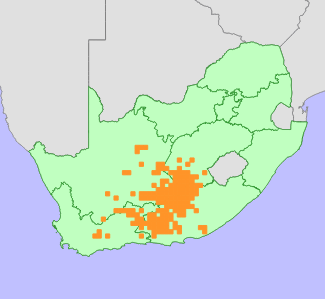|
Scientific Name | Phymaspermum parvifolium (DC.) Benth. & Hook. ex B.D.Jacks. |
Higher Classification | Dicotyledons |
Family | ASTERACEAE |
Synonyms | Adenachaena parvifolia DC., Adenachaena pubescens DC., Phymaspermum pubescens (DC.) Kuntze |
Common Names | Bankrotbossie (a), Galsteenbossie (a), Goeiekaroobossiea (a), Good Karoo (e), Karoobossie (a), Skaapbossie (a), Skaapkaroo (a), Swartkaroo (a), Vaalkaroo (a), Witblommetjie (a), Witheuningkaroo (a) |
National Status |
Status and Criteria | Least Concern |
Assessment Date | 2017/01/26 |
Assessor(s) | L. von Staden |
Justification | Phymaspermum parvifolium is widespread with an extent of occurrence (EOO) of 277 119 km². It is not in danger of extinction, and is therefore listed as Least Concern. |
Distribution |
Endemism | South African endemic |
Provincial distribution | Eastern Cape, Free State, Northern Cape, Western Cape |
Range | This species is endemic to South Africa, and is widespread across the arid central regions. |
Habitat and Ecology |
Major system | Terrestrial |
Major habitats | Gamka Karoo, Escarpment Arid Thicket, Sundays Arid Thicket, Southern Karoo Riviere, Karoo Escarpment Grassland, Xhariep Karroid Grassland, Besemkaree Koppies Shrubland, Tarkastad Montane Shrubland, Eastern Lower Karoo, Upper Karoo Hardeveld, Eastern Upper Karoo, Northern Upper Karoo, Western Little Karoo, Steytlerville Karoo, Postmasburg Thornveld, Escarpment Valley Thicket, Fish Arid Thicket, Eastern Gwarrieveld, Olifantshoek Plains Thornveld, Kuruman Mountain Bushveld, Uniondale Shale Renosterveld, Bushmanland Arid Grassland, Winburg Grassy Shrubland, Bloemfontein Karroid Shrubland, Queenstown Thornveld, Prince Albert Succulent Karoo, Vaalbos Rocky Shrubland, Eastern Little Karoo, Koedoesberge-Moordenaars Karoo |
Description | It occurs in karroid shrublands and thicket, 300-1500 m. |
Threats |
| This species is under threat by habitat degradation, habitat loss and invasive alien species. |
Population |
Phymaspermum parvifolium is a common to dominant species of karoo vegetation.
|
Population trend | Stable |
Assessment History |
Taxon assessed |
Status and Criteria |
Citation/Red List version | | Phymaspermum parvifolium (DC.) Benth. & Hook. ex B.D.Jacks. | LC | 2017.1 | | Phymaspermum pubescens (DC.) Kuntze | Least Concern | Raimondo et al. (2009) | | Phymaspermum parvifolium (DC.) Benth. & Hook. ex B.D.Jacks. | Least Concern | Raimondo et al. (2009) | |
Bibliography |
Raimondo, D., von Staden, L., Foden, W., Victor, J.E., Helme, N.A., Turner, R.C., Kamundi, D.A. and Manyama, P.A. 2009. Red List of South African Plants. Strelitzia 25. South African National Biodiversity Institute, Pretoria.
Ruiters, A.K., Tilney, P.M., Van Wyk, B.E. and Magee, A.R. 2016. Taxonomy of the Genus Phymaspermum (Asteraceae, Anthemideae). Systematic Botany 41(2):430-456.
Vlok, J. and Schutte-Vlok, A.L. 2010. Plants of the Klein Karoo. Umdaus Press, Hatfield.
|
Citation |
| von Staden, L. 2017. Phymaspermum parvifolium (DC.) Benth. & Hook. ex B.D.Jacks. National Assessment: Red List of South African Plants version 2024.1. Accessed on 2025/12/23 |
 Comment on this assessment
Comment on this assessment

